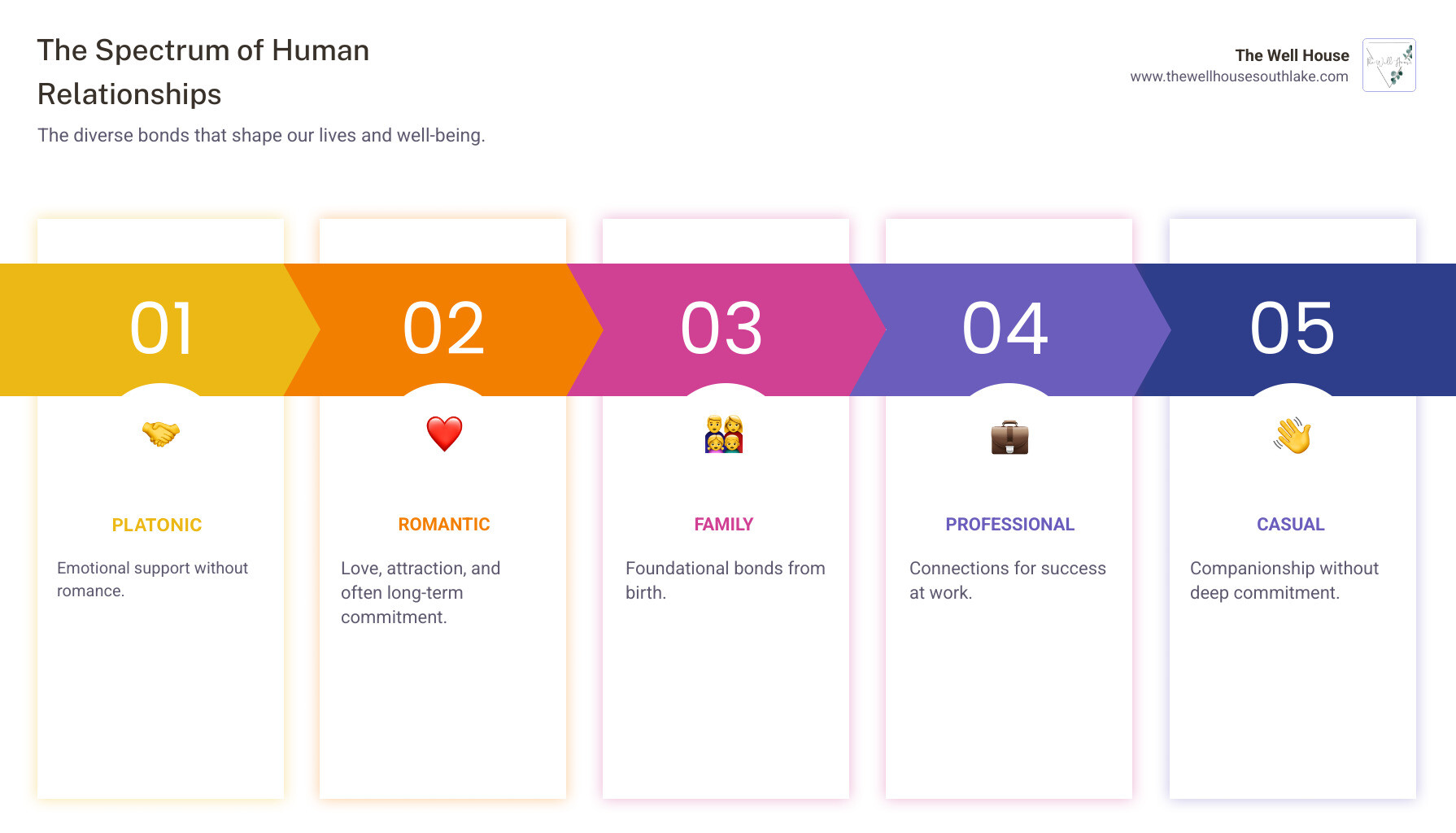Love, Laughter, and Learning: A Guide to Nurturing Your Relationships
Why Understanding Relationships is Essential for Your Well-being
Relationships are the foundation of human happiness. Understanding how our connections with friends, family, romantic partners, and colleagues work can transform our lives. These bonds, ranging from intimate to casual, define much of our experience.
Key types of relationships include:
- Platonic: Emotional support without romance.
- Romantic: Involve love, attraction, and commitment.
- Family: Our foundational bonds from birth.
- Professional: Connections that help us succeed at work.
- Casual: Companionship without deep commitment.
Research shows that healthy relationships boost your immune system, reduce stress, and lower your risk of depression, while toxic connections harm both mental and physical health. The cornerstones of healthy bonds are trust, honesty, open communication, and mutual respect.
As one expert notes, “Love is one of the most profound emotions known to human beings.” Yet many of us were never taught the skills to build and maintain these vital connections.
I’m Jennifer Kruse, a Licensed Professional Counselor Supervisor specializing in relationships in the Dallas-Fort Worth area. I’ve seen how understanding relationship dynamics can heal anxiety, reduce stress, and restore joy.

Explore more about relationships:
The Spectrum of Human Connection: Understanding Different Types of Relationships
As social beings, we naturally form bonds that become the foundation of our happiness and growth. Every relationship serves a purpose, whether it’s a friend who makes you laugh, a supportive family member, or a romantic partner. Understanding these different connections helps you nurture them more effectively.
Defining Different Types of relationships
Relationships come in many forms, each with a unique purpose.
Friendships are our “chosen family.” These platonic relationships are built on mutual trust, shared interests, and genuine affection. Friends celebrate our wins and support us through tough times, and research shows these connections can boost your immune system and reduce depression.
Romantic relationships involve love, attraction, and the desire to build a future together. They begin with feelings fueled by brain chemicals like dopamine and oxytocin but mature into a deeper bond combining passion with friendship and mutual respect.
Family connections are our original relationships. These bonds with parents and siblings shape who we become. While they can be wonderfully supportive, they can also be complicated.
Casual relationships meet needs for companionship and intimacy without long-term commitment. For these to be successful, both people must be clear about expectations.
Professional relationships with colleagues or classmates add richness to daily life, providing collaboration, support, and sometimes unexpected friendships.
Some relationships can become unhealthy. Codependent relationships involve excessive emotional reliance, while open relationships can work for some when there’s clear communication and boundaries about having multiple partners.
Understanding these types helps you set appropriate expectations, a crucial skill for young adults. More info about Young Adult Therapy in Southlake, TX can provide guidance during this time.
How Relationships Impact Your Well-Being
The quality of your relationships impacts your entire well-being. Good connections are like vitamins for your soul, while toxic ones can make you sick.
Your mental health thrives on healthy connections. Supportive relationships act as an emotional safety net, reducing feelings of loneliness and isolation. The American Psychological Association notes that friends wanted is not just a preference but an essential need for psychological health.
Your body also benefits from loving connections. Physical affection releases oxytocin (the “cuddle hormone”), which strengthens your immune system and helps manage stress. People in healthy relationships tend to have lower blood pressure and even live longer.
Conversely, toxic relationships can harm your physical health. Chronic relationship stress is linked to heart problems and weakened immunity. Research on stress and negative relationship quality among older couples confirms the link between relationship problems and physical health.
When relationships struggle, it can create a cycle of anxiety and depression. If you’re experiencing this, know that help is available. More info about Anxiety & Depression Counseling Southlake can help break these patterns and restore balance.
The Anatomy of Healthy vs. Unhealthy Relationships
Think of relationships like plants; some flourish while others wither. The difference lies in what nourishes the connection versus what poisons it. Healthy relationships aren’t about perfection, but about two people choosing to grow together and treat each other with kindness and respect.
Characteristics of a Healthy Connection
Healthy relationships are defined by adaptability. As therapist Lindsey Antin explains, “They adapt to circumstances and the fact we’re always changing and going through different phases in life.” This flexibility is key.
- Trust and honesty form the bedrock, creating emotional safety where both people can be authentic.
- Open communication means expressing needs and feelings respectfully, even during disagreements.
- Mutual respect involves honoring boundaries, valuing opinions, and celebrating differences.
- Individuality is supported, allowing both partners to maintain friendships, hobbies, and dreams outside the relationship. This balance between interdependence and independence is vital for self-esteem.
- Compromise and fairness ensure the give-and-take feels balanced over time.
- Playfulness and laughter help couples weather storms and maintain a sense of lightness.
Here’s how healthy traits compare to unhealthy ones:
| Healthy Traits | Unhealthy Traits |
|---|---|
| Open Communication | Dishonesty, Withholding Information |
| Mutual Respect | Disrespect, Belittling |
| Trust & Honesty | Deceit, Betrayal |
| Support for Individuality | Control, Isolation |
| Compromise & Fairness | Inequality, One-sided Giving |
| Empathy & Understanding | Lack of Empathy, Indifference |
| Shared Decision-Making | Manipulation, Coercion |
| Feeling Heard & Valued | Feeling Unheard, Dismissed |
| Safe to Express Disagreement | Fear of Expressing Disagreement |
| Adaptability & Growth | Rigidity, Resistance to Change |
Warning Signs of a Toxic or Unhealthy Dynamic
Recognizing the warning signs of a toxic relationship can protect your mental health.
- Control: This often starts subtly, like a partner suggesting you skip plans with friends, but can escalate to isolating you from loved ones.
- Disrespect: This includes constant criticism (even disguised as “feedback”), mocking your ideas, or belittling your achievements.
- Dishonesty: Lying, withholding information, or creating stories to cover up behavior destroys the foundation of trust.
- Gaslighting: This form of manipulation makes you question your own memory and reality. A partner might deny things they said or call you “too sensitive” for being hurt.
- Inequality: A relationship is off-balance if one person is always the one putting in the effort, apologizing, or accommodating.
- Fear: You should never be afraid to disagree or express your needs. Fear of your partner’s reaction is a serious red flag.
Some signs require immediate attention, including physical violence or sexual coercion. The Massachusetts government offers guidance on What Does an Unhealthy Relationship Look like?.
If you recognize these patterns, especially those involving abuse, please seek help. Your safety is paramount. The National Domestic Violence Hotline provides confidential support 24/7 at 1-800-799-7233. You deserve connections that lift you up.
The Pillars of a Strong Bond: Key Components for Lasting Connections
Lasting relationships are like a well-built home, carefully crafted by two people who choose to invest in their connection daily. The strongest bonds rest on pillars that can withstand any storm.
The Role of Trust and Honesty
Trust is the foundation of the relationship. It’s built brick-by-brick through consistent, honest actions. It’s showing up when you say you will, keeping promises, and protecting your partner’s confidences. Strong trust creates emotional safety, which allows for the vulnerability needed for deep connection.
Rebuilding trust after a breach is possible but difficult. It requires genuine remorse from the person who broke it and significant patience from the person who was hurt. This process often takes time, consistent effort, and sometimes professional help.
Communication: The Cornerstone of Connection
If trust is the foundation, communication is the bridge between hearts and minds. It’s not just about talking more; it’s about connecting better.
- Active listening: Put your phone down and truly hear what your partner is saying without planning your response. Reflect what you heard to ensure you understand.
- Nonverbal cues: Pay attention to body language, which often tells a story words don’t.
- Expressing needs: Be direct and clear. Instead of hoping your partner guesses what you want, state it kindly. “I’m feeling overwhelmed and could use a hug” is more effective than a dramatic sigh.
- “I” statements: This simple shift transforms accusations into conversations. “I feel hurt when…” opens dialogue, while “You always…” builds walls.
Understanding your different styles of giving and receiving love is also key. Learn more about “The 5 Love Languages®” to find what makes you and your partner feel most appreciated.
Respecting Individuality and Setting Boundaries
A paradox of lasting relationships is that the stronger you are as individuals, the stronger you become together. You are two whole people choosing to share a life, not merging into one.
Maintaining your identity by keeping your own friendships and hobbies brings fresh energy to the partnership. Supporting personal growth means cheering each other on as you pursue individual goals.
Setting boundaries isn’t about building walls; it’s about creating a safe space for both people. These personal limits are essential for well-being. Learning how to set healthy boundaries involves being clear, kind, and consistent. For teenagers, this is a crucial skill for developing healthy relationship patterns. More info about Therapy for Teens in Southlake, TX can provide valuable guidance.
When these pillars are strong, relationships don’t just survive; they flourish.
Navigating Challenges and Growth in Your Relationship
Relationships are not fairy tales; they are messy, unpredictable, and challenging. But these challenges are not relationship killers. Handled correctly, they are relationship builders that can make your connection stronger.
Life’s stressors—work, family, health, finances—don’t pause for your relationship. They often reveal cracks in the foundation, but how you weather these storms together is what matters.
Common Challenges in relationships and How to Overcome Them
Certain challenges appear frequently in relationships. These include financial stress, mismatched libidos, parenting differences, and external pressures like job loss or family illness. Fights about these topics are often about deeper issues like values, security, and control.
The key to overcoming them is a teamwork approach. Instead of seeing your partner as the problem, you tackle the issue together as allies. Forgiveness is also essential—forgiving your partner and yourself for not being perfect. Holding onto resentment only makes the journey harder.
The Art of Conflict Resolution
Conflict isn’t the enemy of good relationships; how you handle it is what counts. John Gottman’s research shows that couples who stay together aren’t those who never fight, but those who fight fair.
- Focus on the issue, not the person. Instead of “You’re so lazy,” try “I’m feeling overwhelmed and could use more help.” One attacks, the other explains and requests.
- Keep personal attacks off the table. No name-calling or bringing up old grievances. The goal is to solve the problem, not to win the argument.
- Take a time-out. When emotions run high, agree to take a break and revisit the conversation once you’ve both cooled down.
- Be willing to compromise. Find creative solutions that honor both people’s core needs.
- Know when to let things go. Some differences are perpetual. Learning to accept them with grace and humor frees up energy for what truly matters.
Knowing When to Seek Help
Sometimes, despite our best efforts, we get stuck. Reaching out for professional help is a sign of strength, not failure.
Seek help for:
- Recurring conflicts that never get resolved.
- Communication breakdown, where you feel unheard or are avoiding important topics.
- A lack of trust, whether from a major betrayal or slow erosion over time.
- Feeling stuck or hopeless about the relationship’s future.
The benefits of professional guidance are immense. A therapist provides a fresh perspective, teaches proven communication skills, and offers a safe space to steer difficult conversations. It’s an investment in something you value. More info about Marriage Counseling and Couples Therapy can provide the support you need to turn challenges into opportunities for deeper connection.
Frequently Asked Questions about Relationships
In my counseling practice, certain questions about relationships come up again and again. Here are answers to some of the most common concerns.
What is the most important thing in a relationship?
There isn’t one single magic ingredient, but rather several foundational elements that work together. The most critical are mutual respect, trust, open communication, and emotional safety. When you truly value your partner’s feelings and boundaries, feel safe enough to be vulnerable, and can talk through issues openly, you have the framework for a healthy, lasting bond. When couples strengthen these areas, other challenges become more manageable.
How do you know if a relationship is worth saving?
This is a deeply personal decision, but there are positive signs to look for. A relationship has strong potential for healing if there is still a foundation of respect, even during conflict. It is crucial that there is a willingness from both partners to do the hard work of change—one person cannot save a relationship alone. If you have a shared vision for the future and your core values align, you have solid ground to build upon. If both people are committed to growth, the relationship is often worth the effort.
Can a toxic relationship become healthy?
Honestly, this is exceptionally rare and very difficult. It requires profound, sustained change from the person exhibiting toxic behaviors. For any chance of success, that person must take complete accountability for their actions and commit to intensive personal work, usually with professional help. This is far more than just promising to change. Meanwhile, the partner who has been harmed needs space to heal and establish firm boundaries. Safety must always be the top priority. If there is any risk of continued emotional or physical harm, the healthiest choice is usually to end the relationship and focus on individual healing.
Conclusion: The Journey of Connection
Relationships are like rivers—always flowing and changing. They are not a destination but a living part of who we are, requiring attention, care, and patience. We’ve seen how these connections can impact our physical and mental health, for better or for worse.
Knowledge is power. When you understand what healthy communication and boundaries look like, you can steer disagreements productively and love someone deeply while maintaining your own identity. Building strong relationships takes real work—admitting when you’re wrong, fighting fair, and knowing when to seek help. But the effort you put in comes back to you multiplied in joy and support.
At The Well House, we’ve watched countless individuals and couples transform their connections, from marriages on the brink to families navigating difficult transitions. We believe in meeting you where you are, with no judgment, just genuine support.
Relationships are messy and complicated, but they are also where we find our greatest joys and deepest growth. You don’t have to figure it out alone. Our doors are open to individuals, couples, and families throughout Southlake, Westlake, Grapevine, Roanoke, and Trophy Club.
Ready to invest in the connections that matter most? Begin your journey to a healthier connection with Marriage Counseling and Couples Therapy and find what’s possible when relationships are nurtured with intention and care.














